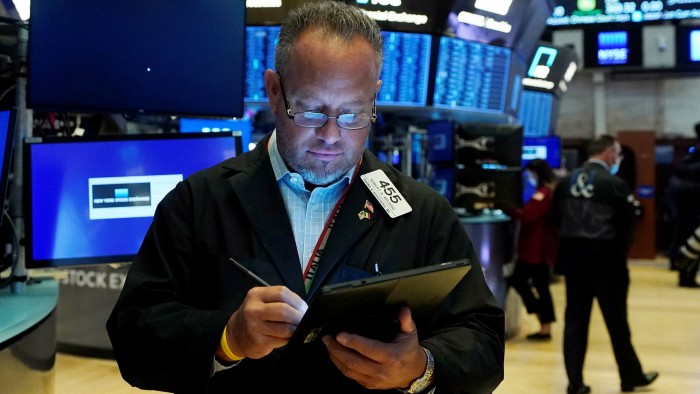Stockpickers find new niche in thematic ETF strategies

Simply sign up to the Exchange traded funds myFT Digest -- delivered directly to your inbox.
Interested in ETFs?
Visit our ETF Hub for investor news and education, market updates and analysis and easy-to-use tools to help you select the right ETFs.
Stock picking has found a niche in the ETF market through thematic strategies, with more shops choosing to eschew indices in their new trend-following products.
Fewer than 18 per cent of the 197 theme-focused ETFs designated by FactSet are actively managed. However, active ETFs represent 26 per cent of the 34 thematic ETFs that launched this year in the US up to August 6.
Five of this year’s 10 best-selling thematic ETFs are actively managed. Ark Investments’ $23bn Innovation ETF picked up $6.7bn in net sales up to August 6, according to FactSet. The $8.7bn Ark Genomic Revolution ETF, meanwhile, garnered $2.5bn in sales; the $3.7bn Ark Fintech Revolution collected $1.9bn; the $1.4bn BlackRock US Carbon Transition Readiness ETF drew in $1.3bn; and the $2.8bn Ark Autonomous Technology & Robotics ETF added $1.2bn.
Overall, active ETFs took in $83bn during the first half of 2021, just under 17 per cent of total US ETF flows, according to FactSet. Active represented 3 per cent of all ETF assets as of June 30.

This article was previously published by Ignites, a title owned by the FT Group.
Ark’s breakthrough 2020 may have been largely driven by performance, analysts note. But the New York-based firm has cracked open the door to portfolio assets enough for other firms with growth-oriented credentials to give it a try, they say.
“Ark has legitimised active management, and also catapulted thematic investing into the mindset for investors,” said Todd Rosenbluth, director of mutual fund and ETF research at CFRA.
But the thematic segment of the market has “a lot of grey area, and so we’re seeing more firms try and fashion themselves as the next Ark, the next iteration of this trend”, he said. But “it’s not clear that investors care. They’re going to look at companies based on their recent performance.”
Thematic ETF managers, meanwhile, argue that their choice of active or passive is far more nuanced.
“I don’t think there’s anything about the past year that’s changed our approach,” said Ryan Issakainen, ETF strategist at First Trust. “When we do launch active funds, we’re very selective in the strategies for which we utilise it.”
The firm has run thematic index-based ETFs since 2006, when its Dow Jones Internet Index Fund launched, he noted. The $10.8bn ETF’s track record validates the long-term viability of grouping stocks across sectors with economic ties to a trend, he added.
“What you see is what you get with a thematic index-based product,” Issakainen said. Active versions, meanwhile, give managers free rein to interpret a theme, he added. And thematic benchmarks involve a greater level of human judgment by the index provider than broad-based or factor-focused indexes do, he noted.
First Trust has ventured into active thematic ETFs in cases where the firm wants flexibility in how to interpret or articulate the product’s theme, he said.
For example, the company in late May launched its $3m Innovation Leaders ETF, which invests in companies that are at the front lines of several trends. However, some of the industries included in the index may be represented by only a handful of stocks and are too small to fit in a stand-alone index, Issakainen noted.
Amplify Investments takes a similar approach to First Trust, choosing active for “dynamic market segments”, or areas where it wants to be tactical in managing risk in such stocks, said CEO Christian Magoon. For example, the firm’s $1.2bn Transformational Data Sharing ETF, which launched in 2018 and focuses on blockchain and crypto-sensitive stocks, has a makeup that is best captured with active oversight, he noted.
“It’s hard to create a rule-based index around a segment that is so innovative,” he wrote in an email. The firm was also able to buy up small names in large portions, with the manager controlling diversification risk. Amplify followed a similar approach with medical and recreational cannabis
But getting investors to buy into active still requires a lot of patience and persistence, analysts and executives noted.
Index-tracking ETFs have the practical benefit of being easier to get through distributor due diligence, Issakainen said.
And Ark’s breakout 2020 came six years after the products debuted, and after doubling down on underperforming stocks like Tesla, Rosenbluth said.
“The asset management industry has long done a good job of offering fast-follower products,” he said. “Active thematic is broad enough that we’re going to see dozens of more ETFs come out.”
*Ignites is a news service published by FT Specialist for professionals working in the asset management industry. It covers everything from new product launches to regulations and industry trends. Trials and subscriptions are available at ignites.com.

Click here to visit the ETF Hub

Comments